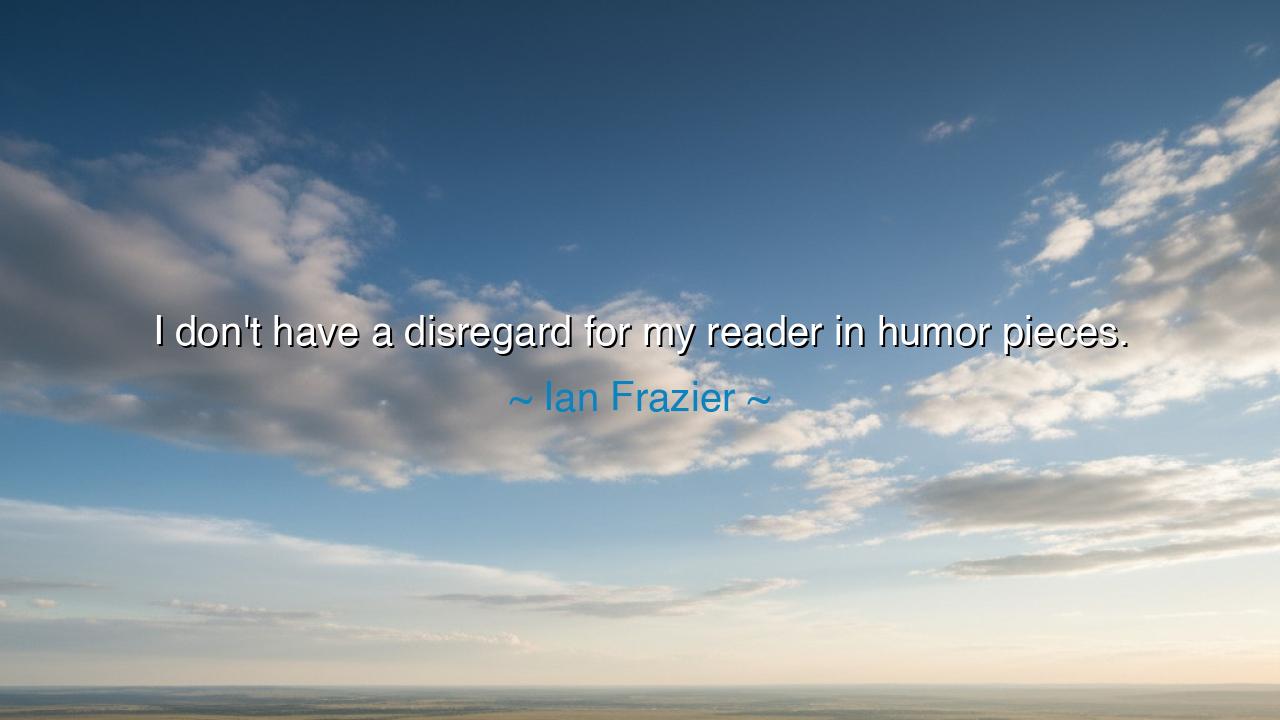
I don't have a disregard for my reader in humor pieces.






When Ian Frazier declared, “I don’t have a disregard for my reader in humor pieces,” he was not simply speaking as a humorist — he was speaking as a moral craftsman of words. His statement, though soft in tone, resounds like the voice of an elder philosopher, reminding all who wield laughter that humor is not chaos, but a sacred art. In these few words lies an ancient principle: that to make another laugh is to touch their spirit, and that such power demands respect. The reader, for Frazier, is not a faceless crowd to be entertained at any cost, but a partner in the act of creation — a soul deserving of regard, intelligence, and empathy.
The meaning of this quote reaches deep into the philosophy of human connection. Humor, when wielded without care, becomes cruelty; it mocks rather than enlightens, alienates rather than unites. But Frazier’s words reveal a higher path — one where the humorist does not stand above the audience but walks beside them. To have regard for the reader is to laugh with them, not at them. It is to know that every jest, every turn of wit, must carry not arrogance, but understanding. In this, Frazier speaks to all creators: that art is not a declaration of the self, but a communion with others.
In the ancient world, the great orators and philosophers knew this truth well. Socrates, in his dialogues, often used humor — but never to humiliate. His irony revealed truth gently, coaxing wisdom out of laughter. Aristophanes, the master playwright of Athens, used comedy to expose the absurdities of his society, yet beneath his satire lay love for his people. He mocked, but he also mourned; he ridiculed, but he also redeemed. That is the kind of humor that Frazier champions — humor rooted in respect, sharpened by intelligence, and softened by compassion. He reminds us that laughter without respect is mere noise, but laughter with understanding is art that endures.
Consider the life of Mark Twain, the great American humorist. Twain could make the world roar with laughter, yet his wit always carried wisdom. In Huckleberry Finn, he used humor to reveal the absurdity of racism and the hypocrisy of society, not to belittle his readers but to awaken them. His laughter was not mockery; it was medicine. Twain’s genius lay not just in his wit, but in his deep regard for his audience — he trusted their intelligence and their conscience. Like Frazier, he knew that humor, when born from empathy, can open eyes that argument alone cannot. For truth delivered with laughter strikes deeper than truth delivered with anger.
Frazier’s words also stand as a warning to those who would trade insight for shock. In an age where comedy often chases outrage, where laughter is bought through insult, his message is a call to integrity. To disregard the reader is to assume they will accept anything, no matter how shallow or cruel. But the true humorist respects the reader’s mind; he seeks not to dominate it, but to engage it. Frazier’s humor, like that of the masters before him, flows from restraint — from the belief that laughter born from thought lasts longer than laughter born from mockery. His respect is not weakness; it is strength, for it recognizes the shared humanity between writer and reader.
This reverence for the audience echoes through history. The Roman orator Cicero once said that wit must “heal, not wound.” Even the Stoics, masters of self-discipline, valued humor as a mark of wisdom — the ability to see folly without hatred, to laugh at life’s contradictions while maintaining dignity. So too does Frazier’s philosophy belong to this lineage of humane laughter. It is a rejection of cynicism and an embrace of grace — the belief that humor, when crafted with care, can bridge divides that anger cannot.
So, my listener, let this wisdom settle within you: to regard your audience is to honor your own soul. Whether you speak, write, teach, or jest, do not treat those who listen as lesser beings. Share your words as gifts, not weapons. If you make others laugh, let it be through recognition, not ridicule — through the warmth of truth, not the chill of cruelty. Ask yourself, before you speak: Does this unite or divide? Does it heal or harm? For laughter, when used with love, is a flame that enlightens, not burns.
In the end, Ian Frazier’s lesson is one of reverence — for laughter, for language, and for the people who receive them. Humor, he teaches, is not license but responsibility. To create joy in another without diminishing them is one of the highest forms of art. Therefore, let your words be guided by empathy, your wit by kindness, and your laughter by wisdom. For humor that honors its audience becomes eternal — it does not vanish when the laughter fades, but lingers in the heart as a gentle reminder of our shared humanity. And that, my friends, is the truest kind of laughter — the laughter of the wise.






AAdministratorAdministrator
Welcome, honored guests. Please leave a comment, we will respond soon